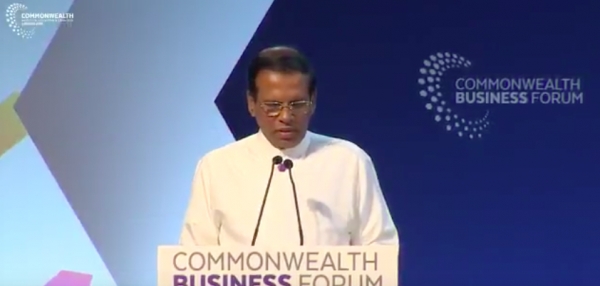President Maithripala Sirisena, addressing the Commonwealth Business Forum in London a short while ago, said good business practices would act as a catalyst for peace and good governance, and should reflect social responsibilities and uphold rule of law with zero tolerance on corruption.
In his address, the President said, “In 2015, the world came together and agreed upon a common vision for a sustainable future in adopting the 2030 agenda for sustainable development in order to create a world that is socially just, prosperous and sustainable.
The plan of action we agreed upon is inspiring, therefore it is very important we give life to this ambitious development plan all the way through to successful implementation.
In order to eradicate poverty, address climate change and build peaceful, inclusive societies, it is agreed that the key stakeholders must come together.
These include not only the government, but also the business and civil societies and communities. The primary responsibility of policy implementation lies with the government. In many countries, like in Sri Lanka, Head of State and government are personally leading this effort.
Inclusive and sustainable business models will lead to sustainable development, especially projected towards the longer term.
Good business practices would be a catalyst for peace and good governance. It should reflect social responsibilities and uphold rule of law with zero tolerance on corruption.
Such practices will enable inclusive growth and common prosperity. It is encouraging to see an increase in public/private partnership to deliver much-needed infrastructure to attain sustainable development goals.
I take this opportunity to request you all as socially responsible partners, to consider as part of your business models, to include technical and financial contribution to the implementation pace of the SDGs.
The world today is united in the effort to create cleaner, greener and sustainable energy. There is no standard approach for implementing the SDGs, and each country decides its own path. However, the approach led by our countries should be people-centred.
Sri Lanka government, as a means of advancing the implementation process, created a special ministry for sustainable development, integrating the SDGs to the overall national policies
Our governments “blue-green” economy plan will ensure the full utilization of the ocean and other natural resources of Sri Lanka, in an environmentally friendly and sustainable manner.
Through this economic strategy, Sri Lanka hopes to become a role model for addressing the best practices. I call upon everyone present to join hands with the commonwealth countries we well as others, to bring prosperity with best practices that will promote social responsibility and ensure social inclusiveness.
Real alignment of business, society and government will depend on these stakeholders aiming to achieve cohesive social responsibility for the best satisfaction of the people.
I wish everyone here will commit, plan and programme to reach that level and alignment.”










